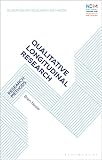Qualitative longitudinal research: research methods
Material type: TextPublication details: Bloomsbury Publishing Pvt. Ltd. New Delhi 2021Description: x, 164 pISBN:
TextPublication details: Bloomsbury Publishing Pvt. Ltd. New Delhi 2021Description: x, 164 pISBN: - 9781350188952
- 001.42 NEA
| Item type | Current library | Collection | Call number | Copy number | Status | Date due | Barcode | |
|---|---|---|---|---|---|---|---|---|
 Book
Book
|
Indian Institute of Management LRC General Stacks | Operations Management & Quantitative Techniques | 001.42 NEA (Browse shelf(Opens below)) | 1 | Available | 004375 |
Table of Contents
Series Editor Foreword
1. Introducing Qualitative Longitudinal Research
2. Conceptual Foundations: Rethinking Time and the Life Course
3. Crafting QL Research: Data Generation and Analysis
4. The Ethics of Quantitative Longitudinal Research
5. Re-Using Quantitative Longitudinal Data
6. The Value of Qualitative Longitudinal Research
References
Index
First published Open Access under a Creative Commons license as What is Qualitative Longitudinal Research?, this title is now also available as part of the Bloomsbury Research Methods series.
This volume offers a new introduction to an evolving research method in the social sciences. Qualitative Longitudinal (QL) research is conducted through time. In its qualitative dimensions it opens up the potential to 'think dynamically' in creative, flexible and innovative ways. QL enquiry is rooted in a long-established tradition of qualitative temporal research, spanning the fields of social anthropology, sociological re-studies and biographical research. But over the past two decades, a growing body of scholarship has begun to document this approach and explore its theoretical underpinnings. This in turn has fuelled a growing interest in and rapid uptake of QL methodology across the disciplines and in international context.
This practical volume will be a first port of call for students and researchers wishing to use QL research in their own projects. The chapters follow a logical development, from conceptual and methodological foundations, to research practice and ethics, to the generation and analysis of data. Each chapter offers practical examples drawn from the research field to illustrate key themes and the rich possibilities for new applications.
There are no comments on this title.
